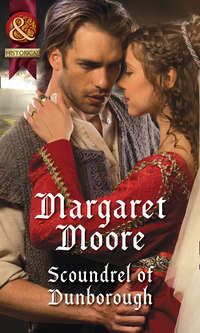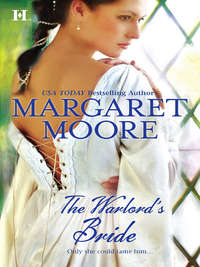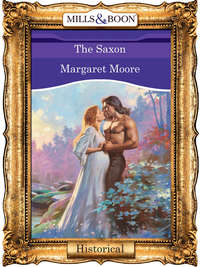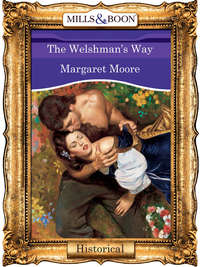
Полная версия
My Lord's Desire
His cell in France had been as dark as dusk during the day, as chill as autumn, and black as pitch at night. He’d had no candle, no rush light, no torch—nothing to relieve the gloom. That had preyed on his mind as much as his regrets, his fears for his men, and his concern about Bayard, who’d been commanding another of the king’s castles before it, too, had fallen.
The sight of the tavern, with its sign portraying two stags’ heads swinging outside the door, brought his thoughts back to the present, and the pungent scents of ale, straw, beef stew and bread filled his nostrils as Godwin led the way inside the low building.
Several farmers were seated in a corner, deep in discussion about the wool crop. A traveling merchant napped in the corner near the hearth, a plate containing a heel of bread and the remains of a thick stew near his elbow, his mug of ale clutched in one hand and precariously perched on his large belly. Two young men were sprawled at another table watching the sleeping merchant like two foxes eying a single hen, quietly making bets on when the mug would tip and spill the ale.
A pleasant-looking, buxom woman in a loose-fitting gown belted with a large apron greeted Godwin warmly and nodded at a table and bench not far from a large cask of ale that had already been tapped. “Sit ye there, boys, and I’ll fetch you a mug of my best.”
It had been a long time since anyone had called Armand de Boisbaston a boy, yet he was far from offended; indeed, he quite liked her familiar address. It made him feel like a youth again.
Because he also wanted to speak to Godwin about something important, he was pleased to note that the bench and table she indicated were in a corner of the room. They wouldn’t be overheard by the other customers or anyone passing by the small windows, for the shutters were open to let in the fresh summer air.
“Would you like a bite to eat, too?” Bessy asked.
Godwin grinned. “Aye, some bread and stew for me. What about you, my lord?”
Armand shook his head. He’d rather save the money, although the aroma wafting in from the kitchen made his mouth water.
“As you will,” Bessy said with a toss of her light brown hair before heading to the kitchen.
“Well, my lord?” Godwin asked as he slid onto the bench. “Was I lying? Isn’t Bessy something?”
“She is,” Armand agreed.
Godwin chuckled and leaned closer. “I tell you, my lord, if I could get her to marry me, I’d be a happy man.”
“You’d have both a pretty wife and a business that seems to be prospering,” Armand agreed. “She must be busy these days with all the people visiting Ludgershall while the king’s in residence.”
“Aye, she is. Merchants and tradesmen from London and all over England have been coming here.” Godwin lowered his voice. “She could do without them routiers, though. A bad lot, the bunch o’ them.”
Armand thought of another pretty woman who had to endure men’s unwanted attention, and felt a twinge of regret that he hadn’t come up with a better plan to confer with her.
Bessy set down two frothing mugs of ale and shook her head when Armand went to pay. “You’re Armand de Boisbaston, aren’t you?”
“I am.”
“Thought so. I heard about your hair. No charge for you, then, my lord. Keep your money for your brother’s ransom. He come here once and did me a bit of service. There was a rough lout who wouldn’t pay for his meal. He paid up quick enough when he had the tip of your brother’s sword at his throat.” She grinned at the memory, then frowned when Godwin’s hand went to the purse at his belt.
“Nor you, neither, Godwin,” she said. “Your ale’s free till Christmas for fixing my roof.”
She winked at the soldier, and then hurried off to take more bread to the farmers.
“She’s very generous,” Armand noted.
“Aye,” Godwin murmured as Bessy lifted the mug from the slumbering merchant’s hand without waking him.
As the pair of young men chastised her for spoiling their entertainment, she gave them a maternal smile and said, “Mind your manners, boys, or I’ll make Moll stay in the kitchen.”
They groaned and Armand turned to Godwin. “Who’s Moll?”
“Bessy’s daughter, and as pretty as her mother.”
At nearly the same time, a young woman appeared in the doorway leading to the kitchen. She was very pretty, in an apple-cheeked, robust way. She held a plate of steaming stew in her hand, with a small loaf on the side, and although she didn’t look at her two young admirers, Armand realized she was well aware they were there.
She smiled at Godwin as she set the food before him and acknowledged Armand’s presence with a little dip, although as she did, she slid the two young men a glance. She had an even saucier swing to her hips when she strolled toward them afterward.
“A young unmarried woman like that can cause a lot of trouble in a village,” Armand said.
“Oh, she’s a good girl, is Moll,” Godwin replied as he ate the stew with gusto. “And it’s no secret she’s sweet on the smith’s son. They’d be married by now if he wasn’t livin’ with his parents. He’s started buildin’ a house, though, so it’s likely they’ll marry before the winter.”
“Those two lads will be disappointed.”
“Not much. They just like to tease her.”
And indeed, their easy banter with the young woman belied any serious intent on their part.
After looking around to make sure no one was paying any attention to them, Armand leaned closer to Godwin and got down to business. “I’m glad I met you this morning, Godwin. I have a message for the earl, and I’d like you to take it.”
Godwin stopped eating and regarded him gravely. “Of course, my lord, if the steward will give me leave.”
“I think he will,” Armand said. “I need to send another to Canterbury, as well. Is there someone you could recommend to take it, someone who’s as trustworthy as you?”
Godwin’s expression was thoughtful, as well as proud. “Bert’s a good lad and he can’t read, so even if I’m wrong, he wouldn’t know what was in the letter.”
Satisfied, Armand nodded. “I’ll write the letters and speak to the steward as soon as we return.”
“What ho within!” a jovial young man shouted outside to accompaniment of laughter and the stamp of horses’ hooves. “Bessy my love, I’m parched!”
The door to the tavern burst open and five young noblemen came stumbling into the taproom, laughing and swearing. Leading the pack was the already drunk Sir Alfred de Marleton, followed by Lord Richard d’Artage. Then came Charles de Bergendie who Armand knew by reputation; he was said to be a worthy opponent in a melee, despite his youth. Sir Edmond de Sansuren and his brother, Roger, brought up the rear. Armand knew nothing bad of those two, except that they seemed to follow whoever was of a mind to lead them. Apparently, they were following Alfred today, at least as far as wine was concerned.
Bessy marched into the room just as a sixth young man joined the band of drunken knights—the dark-haired, bearded and seemingly sober Sir Oliver.
“Well, now, what have we here?” the alewife asked, one hand on her ample hip.
Although she smiled, Armand was quite sure she was neither pleased nor impressed with these potential customers, whether they were noblemen or not. Her daughter, meanwhile, sidled toward her mother, and the door to the kitchen.
“Some very thirsty fellows,” Sir Alfred said with a sodden grin. “We thought we might find something to assuage it here.”
“Aye, you might,” Bessy answered.
Alfred leered at Moll. “Oh, I think we will. And we’re hungry, too.”
He lunged for Moll, grabbed her arm and pulled her toward him. “Very hungry,” he murmured, running his hand over her bodice, “and here’s just the morsel to sate us.”
As Moll emitted a screech of fear, Armand jumped to his feet. Godwin rose, too, his hand on the hilt of his sword. The two lads, their faces red with anger, likewise got up. The group of farmers stood more slowly, but their expressions were just as angry. The merchant, awakened by the commotion, looked about wildly, his hand going to the handle of the dagger visible in his belt.
“Are you forgetting that you are a knight, sworn to protect women and children?” Armand demanded of the young noblemen, his stern gaze on Alfred, who was holding the frightened Moll in a grip that made her wince.
“I don’t have to listen to you,” Alfred declared. “You’re no saint, and neither’s Lady Adelaide, from what we’ve heard.”
Then he kissed Moll’s cheek, making her squirm with disgust.
“Let her go,” Armand commanded. He didn’t raise his voice, but when Armand de Boisbaston issued an order in that tone, he didn’t have to.
Scowling but obeying, Alfred shoved Moll away. She ran to her mother, who glared at the knights as if she wanted them boiled in oil.
She probably did.
“The girls of this village are not doxies for your amusement,” Armand said to the swaying Alfred and his friends. “If your oath of chivalry is not enough to make you behave as an honorable man should, I remind you that this estate belongs to the Earl of Pembroke, one of the most chivalrous men alive, and not a man you want for an enemy. What do you think he’ll do if he hears you’ve been abusing his tenants?”
Sir Edmond threw out his chest like an indignant pigeon. “Our father—”
“Is one of the king’s valued counsellors,” Armand interrupted. “What do you think he’ll say when he finds out you’ve risked the ire of William Marshal?”
All trace of bravado fled Edmond’s face. “You’d tell him?”
“If I must.”
Edmond nearly tripped over his own feet trying to get to the door, his brother hard on his heels. Lord Richard shrugged and started after them, while Sir Oliver stayed where he was, watching them all as if this were a performance staged for his benefit.
Armand coolly regarded the three remaining knights. “I suggest, my lords, that you return to the castle at once.”
“You can’t make us go,” Alfred slurred.
Armand raised a brow. “Can’t I?”
Alfred felt for his sword. “You wouldn’t dare attack me!”
Armand held his arms away from his body. “Am I attacking anybody?”
As Alfred continued to try to locate the hilt of his sword, he cried, “You don’t scare me!”
“Then I appeal to whatever remains of your honor. Your behavior here has been a disgrace.”
“I’ve done nothing to be ashamed of! Why, I hardly touched her! You’d think I’d raped her, the way you’re acting.” His own words seemed to encourage him. “And since when are you the arbiter of chivalry and honor? You seduced Lady Adelaide. It’s all over the court that you two were making love in the garden.”
It took a great effort not to strike the sot for his insolence, and to wipe the smirk off his face. “We did not make love in the garden.”
Alfred and Charles stared at him with blatant disbelief, while Sir Oliver’s face betrayed nothing.
Albert straightened his shoulders. “Well, nobody but the lady can vouch for that. Everyone knows you surrendered Marchant.”
“What do you know of battle, bravery or defeat?” Armand asked, trying to hold on to his patience. “I surrendered after being besieged for months, when there was no hope of relief, and even then, only after the French king threatened to destroy the village and kill all the people in it. Would you rather I let Philip kill an entire village of innocent peasants? And have I not paid for my failure, if failure it was?”
Alfred didn’t meet Armand’s steadfast gaze. “I think…I think I’m a little drunk,” he muttered.
“Yes, you are, although that’s no excuse for your disgraceful behaviour,” Armand said, his anger lessening. Young men in their cups often said and did things they later regretted, as had he, although he’d never accosted a woman. “Go back to Ludgershall and sleep it off.”
He headed to the door, making it clear he intended to see that Alfred did as he was told, and believing there was hope for these young fellows yet, if they had other examples of honorable behaviour than the king and his sycophants.
“The rest of you, as well—back to Ludgershall,” he ordered, holding the door open and waiting for them to pass.
Charles likewise made no protest, and left.
His head bowed, Alfred dutifully departed. For a moment, Armand thought the Irishman was going to refuse, but then he shrugged his shoulders and strolled out the door as if Armand’s order was just a suggestion and he had nothing else to do.
Insolent pup!
Godwin also started to leave, until Armand waved him back. “Stay and finish your stew.”
“Thank you, my lord,” Godwin replied with a grin, and the women smiled gratefully as they bade Armand farewell.
AS ARMAND was ensuring that the young knights returned to the castle without further incident, Adelaide walked briskly across the courtyard. In her hand she held a scroll, a letter to her sister Gillian that one of the king’s clerks had written for her.
She didn’t really need any man’s aid to write a letter. She and her sisters had been taught to read and write by their father’s steward, one of the many secrets in their father’s household while he’d been alive. Her father had believed that educating women was a waste of time and effort, and by the time she was old enough to realize there was such a thing as reading and writing, her mother had been so worn out giving birth to her sisters and other babies who had not lived, she had no strength to teach her.
Adelaide, however, had not wanted to remain ignorant. As she’d pointed out to her father when he was in a rare, peaceable humor, being able to read and write would increase her value to a potential husband.
His good humor had died in an instant, and he’d thrown his goblet at her. “Think you know better than me, girl?” he’d shouted.
Thankfully his steward, Samuel de Corlette, had heard the exchange. Afterward, he’d told Adelaide she was right to want to learn. “After all,” he’d said, smiling kindly, his face lined with furrows of stress from dealing with her father all those years, “your father will not live forever.”
So he had not—and the day he died, not a single person had mourned his passing.
It had been different when kind-hearted, patient Samuel had died. He’d been born the bastard son of a Norman foot soldier, but he’d been more honorable, noble and kind than most noblemen she’d met, and everyone at Averette had been saddened by the loss.
Here at Ludgershall, the clerks had flocked about her like so many busy bees when she’d appeared in their chamber and asked if any of them had a moment to spare to write a letter for her. All had smiled and several had offered, while she’d dithered and demurred and apologized for taking them from their worthy labors. She’d been able to hear most of them say something in response.
Конец ознакомительного фрагмента.
Текст предоставлен ООО «ЛитРес».
Прочитайте эту книгу целиком, купив полную легальную версию на ЛитРес.
Безопасно оплатить книгу можно банковской картой Visa, MasterCard, Maestro, со счета мобильного телефона, с платежного терминала, в салоне МТС или Связной, через PayPal, WebMoney, Яндекс.Деньги, QIWI Кошелек, бонусными картами или другим удобным Вам способом.








